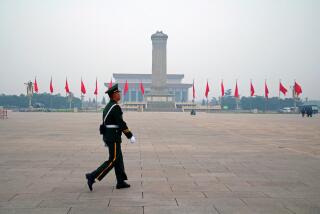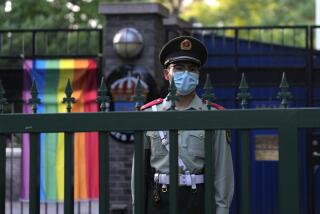China mounts online crackdown amid political crisis
China launched an Internet crackdown Friday amid its worst political crisis in decades, shuttering more than a dozen websites, limiting access to the country’s largest micro-blog providers and arresting six people for spreading rumors about a coup attempt in Beijing.
The measures represent the strongest attempt yet to quash speculation that the nation’s top leadership is wracked by infighting after the ouster of Bo Xilai, the controversial Communist Party chief of mega-city Chongqing.
The official New China News Agency quoted a spokesman for the State Internet Information Office as saying authorities were punishing 16 websites and six individuals for “fabricating or disseminating online rumors” about “military vehicles entering Beijing and something wrong going on in Beijing.”
Sina Corp. and Tencent Holdings Ltd., providers of China’s wildly popular Twitter-like services, said they were halting users’ ability to comment on posts until Tuesday morning to “clean up” what they described as “harmful messages.”
Micro-blog users deemed to have posted offending content have had their accounts frozen in the past. But the latest moves are the most severe in the ongoing struggle to control social media, considered one of the biggest challenges to the government’s authority. Sina and Tencent have a combined 300 million registered accounts, forming a network that can disseminate information across the nation within seconds.
Critics have noted that crackdowns and censorship may actually invite more public interest in the issues authorities are trying to hide.
“Maybe some people still don’t know that this incident has something to do with the internal dispute within the Party Central,” one micro-blogger wrote Saturday on Sina. “What’s ironic is many people who didn’t hear about the rumors will now know everything.”
The Chinese leadership has been trying to project unity ever since Bo’s sacking set off weeks of speculation about a power struggle.
Bo had been a candidate for an elite Politburo Standing Committee position later this year during the nation’s once-in-a-decade transition of power.
But the charismatic populist came undone when his former aide, Wang Lijun, fled to the U.S. Consulate in western Chengdu to seek political asylum. Weeks later, Bo was replaced.
The intrigue has only grown since then with the mysterious death of 41-year-old British businessman Neil Heywood, who had been linked to the Bo family.
Rumors of a coup first surfaced last week on U.S.-based Chinese websites and in Hong Kong and Taiwanese media. Conjecture centered around an alleged power grab by Bo’s patron on the standing committee, Zhou Yongkang.
State media said that in addition to the six people detained, an undisclosed number of people had been “admonished and educated” for spreading rumors about a coup.
RELATED:
China puts a stop to Maoist revival
China coup rumors may be wild, but tension is real
Britain asks China to investigate businessman’s death







